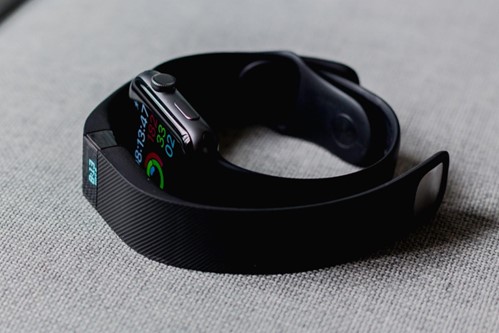Health and wellness have increasingly gained a central focus in modern society. Beyond the fundamental necessity of maintaining good health for survival, there’s a growing emphasis on achieving optimal wellness to improve quality of life, increase productivity, and foster overall societal well-being. Today, health and wellness are viewed not just as the absence of disease, but as a condition of holistic physical and mental well-being.
Simultaneously, the technological evolution in the health sector has been remarkable. From the early days of simple electronic medical records to today’s sophisticated health information systems, progress is evident. Particularly, wearable health technologies are revolutionizing how healthcare is delivered and experienced.
Wearable health technology plays a pivotal role in modern lifestyles by transforming how people track and manage their health. This technology is becoming a key factor in preventive care and chronic disease management, providing valuable real-time health data to both patients and healthcare professionals.
Table of Contents
The rise of health tech spurs the evolvement of the wearable technology
The history of wearable health tech is a tale of constant progression. The industry saw its genesis in simple fitness tracking devices and has now evolved to include advanced wearable devices in healthcare such as smartwatches, sleep monitors, glucose monitors, and more. This progression has been driven by ongoing innovations in technology and a consumer base that increasingly values personalized health information.
Advancements in technology, particularly in wearables, have considerably impacted the health sector and modified healthcare software development services. These devices provide real-time data, enable remote monitoring, and empower users to take active control of their health. They have transformed the way healthcare professionals deliver care, providing valuable insights into patient health even outside of clinical settings.
Wearable health tech has seen a steep growth trajectory. A multitude of benefits of wearable technology such as the rising awareness about health, an increase in chronic illnesses, and the advent of smart devices have accelerated the adoption of these wearables. The market is anticipated to continue its upward trend as technology evolves and becomes more accessible.
Types of wearable health tech
There are the following types of wearable devices suitable for health monitoring:
Fitness trackers and smartwatches:
These devices offer a variety of features such as tracking physical activity, heart rate, sleep patterns, and more. The data collected provides useful insights into an individual’s health and fitness, guiding them toward healthier lifestyle choices. The latest models of these devices, like the Apple Watch and Fitbit, come equipped with health-oriented features like ECG monitors and oxygen saturation (SpO2) sensors, making them more than just fitness trackers.
Sleep monitors:
Sleep monitors provide detailed insights into an individualєs sleep cycle, helping detect sleep disorders and improve sleep quality. They track factors like sleep duration, deep sleep, and rapid eye movement (REM) stages, providing valuable data for users and healthcare professionals. Devices like the Fitbit Sleep Score and Withings Sleep offer comprehensive sleep monitoring features, aiding users in understanding their sleep patterns better.
Glucose monitors and other medical devices
Wearable technology is revolutionizing disease management. Continuous glucose monitors like the Dexcom G6 and Freestyle Libre provide real-time glucose readings, alerting users about potentially dangerous levels. Other wearable medical devices include heart rhythm monitors like the Zio XT Patch, which aids in detecting arrhythmias and optimizing cardiac care.
How wearable health tech promotes better health
Wearable health technology stands as a significant symbol of the advancement of the healthcare industry, promoting a more personal, insightful, and efficient approach to managing one’s health. The intersection of wearable technology and healthcare has given birth to an ecosystem of data-driven insights and preventive healthcare measures that fosters wellness and disease prevention.
One of the key aspects of wearable devices is viewing real-time health data. Devices such as fitness trackers, heart rate monitors, and sleep monitors generate a vast array of data, ranging from physical activity levels and calories burnt to sleep patterns and heart rhythm irregularities. This data, when combined with advanced analytics and personal health records, can provide a more comprehensive picture of an individual’s health status.
This insight allows individuals to monitor their health progress, set fitness goals, and adjust their lifestyle and habits accordingly. For example, a sudden spike in resting heart rate could indicate stress or an impending illness, while inconsistent sleep patterns may reveal undiagnosed sleep disorders. With this information, users can take preemptive measures, such as modifying their diet, and lifestyle, or seeking professional medical advice.
Preventive healthcare, which seeks to prevent the onset of diseases or manage them at their early stages, has been revolutionized by wearable technology. Devices that monitor vital signs and bodily functions can detect anomalies or deviations that might indicate a potential health issue, long before symptoms become apparent. This early detection system empowers individuals to take proactive steps in managing their health, potentially preventing the development of chronic conditions and reducing healthcare costs.
Wearable technology has also facilitated a shift towards a patient-centered approach in delivering healthcare services. With the insights generated from a health monitor device, individuals can take a more active part in their health management. Healthcare providers, too, can leverage these insights to provide personalized, timely, and efficient care, improving patient outcomes and satisfaction
Future trends in wearable health tech
Emerging tech trends such as artificial intelligence (AI) and the Internet of Things (IoT) are shaping the future of wearables. AI is being used to analyze health data more accurately, providing personalized insights, while IoT is enhancing connectivity and data sharing between devices.
Potential future developments include:
- devices with improved biosensors for real-time disease detection
- integrated health platforms for a more holistic view of health
- wearables capable of offering personalized health recommendations based on genetic makeup
Experts predict an increasingly patient-centric model of healthcare, fueled by advancements in wearable tech. They anticipate more sophisticated health wearables with improved accuracy, functionality, and usability in the near future.
Challenges of wearable health tech adoption
When adopting wearable technologies, healthcare institutions may face the following challenges:
Data privacy and security
Privacy and data security issues are significant when it comes to wearable health tech. These devices collect, transmit, and store sensitive patient data, making it vulnerable to potential malicious attacks and data breaches. User data can be misused if accessed by unauthorized entities, leading to privacy violations. Supply chain concerns and the possibility of medical malware compromising the devices are additional security threats. As wearables often incorporate components from multiple providers, attackers can potentially target the “device within the device”.
Accuracy of health data
Another major concern is the accuracy of the health data that wearable devices collect. Despite being innovative tools that provide valuable health insights, the accuracy of the data collected by these devices can be questionable, especially when it comes to diagnosing medical conditions or monitoring chronic diseases. Wearable devices shouldn’t substitute for professional medical diagnosis and care but rather serve as complementary solutions.
Over-reliance on technology for health management
Over-reliance on wearables for health management can lead to potential health risks. While they offer valuable insights into an individual’s health status, wearable devices should not replace regular check-ups with healthcare professionals. Self-diagnosis without professional consultation, based on data from wearables, could potentially lead to inaccurate health management and missed or delayed professional diagnosis.
Adoption and user compliance
Despite the wider adoption of wearables, encouraging patient compliance remains a challenge. It’s critical for healthcare providers to continue focusing on designing holistic digital services that seamlessly fit into their clinical practices to encourage better adoption and user compliance. As per a report from Accenture in 2022, 80 percent of surveyed healthcare executives reported a significant rise in the use of wearable technology since 2019 as they started promoting devices’ use at their companies.
Data quality and interoperability
Concerns about the quality of data generated by wearable devices and their interoperability with other healthcare IT systems also pose a challenge. Standardizing the quality of data collected across different devices and ensuring these data can effectively integrate with larger health IT systems are crucial for maximizing the potential of wearable tech in healthcare.
Final thoughts
Wearable health tech holds huge promises in transforming healthcare, from enhancing preventive care to managing chronic diseases. The real-time, personalized health data provided by these devices can empower individuals to take control of their health and well-being.
However, while embracing this tech revolution, it’s vital for healthcare professionals to guide patients to use these tools effectively and remind them of the importance of professional medical advice. The future looks bright, with wearable tech playing an increasingly significant role in shaping a healthier society.


